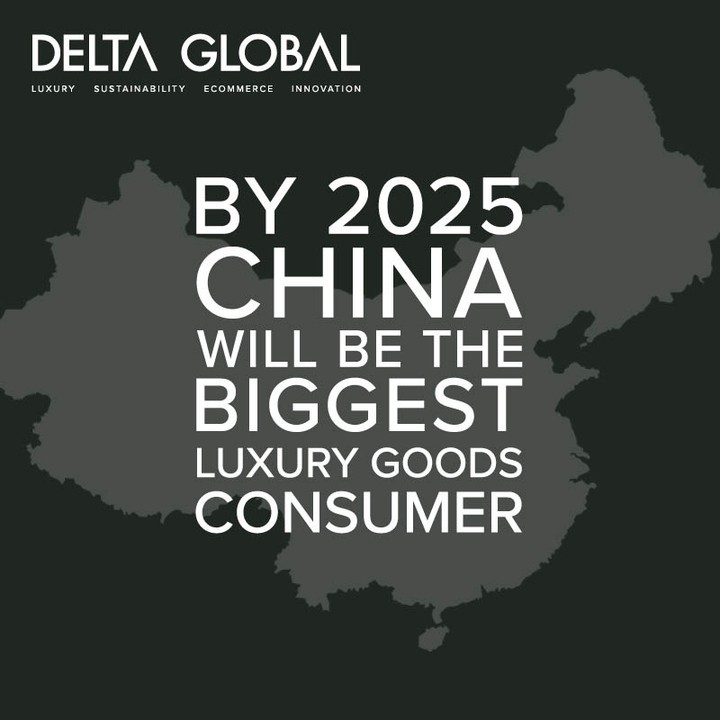
For many years, the idea of second-hand shopping in Asia has been shunned due to a societal stigma of wearing second-hand clothing, but now, as demands for sustainability are spreading across the world, luxury retail in Asia is now changing to meet the needs of consumers.
And with luxury resale now adding another layer to the traditional second-hand market, allowing consumers to access pre-loved, high-end brands for a fraction of the price without the negative impacts on the environment, the world of luxury retail in Asia as we know it is evolving.
This rise in interest in second-hand shopping, particularly for luxury goods, could be the beginning of Asia’s contribution to the circular economy, while simultaneously shifting the traditional opinions of second-hand luxury, which is something Delta Global itself feels particularly passionate about.
How much is the Chinese resale market worth?
According to research by iResearch, the Chinese resale market was valued at 51 billion yuan ($8 billion) in 2020, and is expected to exceed 208 billion yuan ($32.8 billion) by 2025, demonstrating the undeniable rise in the luxury resale market in Asia.
The Coronavirus pandemic had a particular role to play in this development in the fashion resale market, blossoming into a US$40 billion (S$54 billion) industry while other retailers and high-street stores suffered catastrophic losses.
One leading luxury resale market, Vestiaire Collective, reported a surge in demand from Asia, stating that the number of orders increased by 121%, suggesting that this increase was influenced by the younger generation of shoppers, with as many as 54% of Gen Z preferring to shop for pre-owned goods as opposed to shopping via fast fashion routes.
Just as it was in China, the luxury resale market in Asia overall was somewhat slow to take form, particularly in Japan, South Korea, Hong Kong, and Taiwan, however, these attitudes have changed over the last decade for the better, contributing to the net worth of the Asian resale market.

Leading resale brands in Asia
With the increase in demand for luxury resale marketplaces, there are two brands in particular that are contributing to the continued growth of this way of shopping.
HULA, founded by Sarah Fung, who previously worked at a luxury retail store in Hong Kong, is dedicated to making fashion circular, providing designer womenswear at a fraction of the cost while simultaneously helping to save the planet.
Priding itself on its 95% discount on retail prices and wide selection of luxury brands such as Chanel, Celine, Christian Dior, Gucci and Louis Vuitton, HULA is quickly generating a large community of sustainable fashion lovers.
Additionally, there is Retykle, which is unique in its offering by providing a resale platform for luxury and designer childrenswear, and quickly becoming one of the top children's resale marketplaces in Asia, and potentially globally.
With a range of luxury clothing goods for girls and boys in varying age ranges, and even a maternity section, Retykle caters to an entirely different generation, and allows parents to purchase designer clothing for their children with the ability to earn cash or credit by contributing to the circular fashion motive.
How can luxury retail brands in Asia capitalise on the sustainability movement?
While the luxury resale market is becoming increasingly popular in Asia, luxury retail brands are also doing their part for the environment with innovative campaigns.
For example, in October 2021, Net-A-Porter opened up its first Asian pop-up store in Hong Kong, delivering an unconventional yet immersive and engaging experience for Asian consumers, showcasing exclusive designs and staple fashion, beauty, jewellery and lifestyle pieces from leading brands such as Tom Ford, Versace, Valentino and Christian Louboutin.
The event aimed to empower Net-A Porter customers, opening up an entirely new way of shopping for luxury goods and presenting new and exciting shopping opportunities.
For luxury retail brands wishing to improve upon their sustainability efforts without sacrificing the essence of luxury that their consumers have come to expect, they too can look to their packaging offering, adopting the same idea of sustainable yet luxurious packaging solutions.
Luxury resale and packaging
For luxury resale marketplaces looking to capitalise on the ever-expanding Asian retail market while keeping an essence of luxury, they too should consider the way in which they package their items to provide the best possible experience for end consumers.
Combining sustainability with luxury packaging solutions, resale marketplaces such as the RealReal, Vestiaire Collective and Tradesy can appeal to those who prefer to shop for luxury retail in Asia while staying true to the sustainable and eco-friendly mission that underpins the businesses.
From recyclable to reusable packaging options, embellished with an essence of luxury, consumers can enjoy a positive and memorable unboxing experience without the guilt that is often associated with fast fashion shopping.
The future of resale in Asia is imminent
The drastic shift in consumer mindset, driven by the younger generation of consumers and further supported by the likes of thrifting influencers on TikTok, will ensure that the Asia fashion resale market will continue to grow and evolve, while keeping the art of luxury shopping alive.
To discover how Delta Global can assist you with the creation of bespoke, luxury and sustainable packaging solutions to support the sustainability efforts pioneered by the luxury resale market, please get in touch today.
